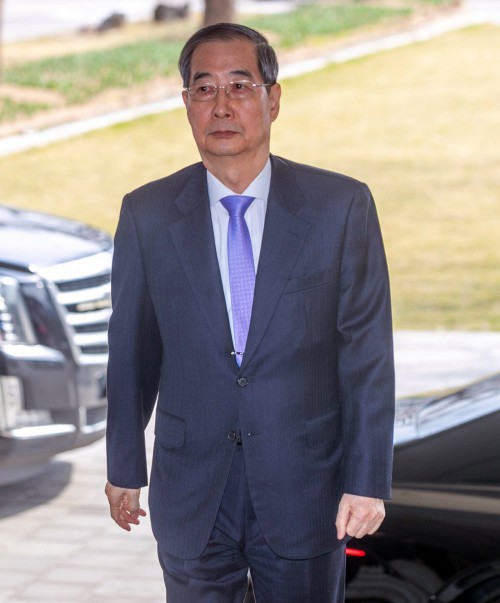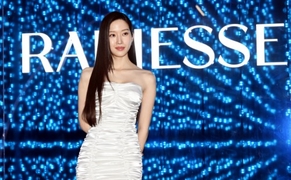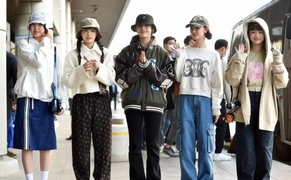 |
| Prime Minister Han Duck-soo returns to work at the Government Complex Seoul and heads to the Prime Minister's Office after the Constitutional Court dismisses the National Assembly's impeachment motion against him on March 24, 2025. /Photographed by reporter Park Sung-il |
AsiaToday reporter Han Dae-eui
With the Constitutional Court dismissing the impeachment motion against Prime Minister Han Duck-soo on Monday, there is growing speculation that the impeachment trial of President Yoon Suk-yeol will also likely be dismissed or rejected. Analysts suggest this is because the key issue addressed in the dismissal of Han's impeachment motion was not the illegality of martial law and conspiracy to insurrection but rather the issue of appointing Constitutional Court judges recommended by the National Assembly. Notably, the court rejected the opposition's claim of "constitutional disorder through martial law" that accused Han of being an accomplice in President Yoon's declaration of martial law.
The Constitutional Court on Monday held a ruling session and dismissed the impeachment motion against Han with five votes for dismissal, one for approval, and two for rejection. The court's decision highlighted three key issues: first, the exclusion of insurrection charges from the impeachment motion; second, the issue of not appointing Constitutional Court judges recommended by the National Assembly; and third, whether the impeachment motion required 200 votes or 151 votes for approval.
Among these, the court only deemed the second issue as a valid reason for illegality. This contradicted earlier expectations that the court would also rule on the unconstitutionality or illegality of the martial law declaration. According to the court's press release, the core issue in dismissing Han's impeachment motion was not his alleged complicity in rebellion but rather the appointment of Constitutional Court judges. In other words, the court did not consider martial law and conspiracy to rebellion as valid reasons for impeachment but instead focused on the issue of appointing judges recommended by the National Assembly.
"The impeachment motion against Prime Minister Han has drawn attention due to its connection to President Yoon's impeachment trial. Particularly, the impeachment motion's claims of martial law and conspiracy to insurrection, as well as the exclusion of insurrection charges, were key issues. However, the Constitutional Court did not find Han's alleged complicity in insurrection to be sufficiently illegal to approve the impeachment motion," former presidential secretary Kim Sung-hoe said. "This is likely to influence President Yoon's impeachment trial as well. However, since Han made it clear that he did not agree with President Yoon's declaration of martial law, there is room for a different evaluation of Han's role as an accomplice. Nevertheless, the court rejected the opposition's claim that 'martial law equals constitutional disorder,’" he added.
“This could have a very positive impact on the dismissal or rejection of President Yoon's impeachment. It has been confirmed that the rebellion charges were withdrawn and that the Constitutional Court judges did not agree on the establishment of insurrection charges. The key issue is whether rebellion acts are recognized, and the court did not acknowledge 'martial law equals rebellion,'" Kim said.
Previously, the Constitutional Court stated regarding the impeachment grounds related to "martial law declaration and insurrection acts," that "(Prime Minister Han) did not engage in active acts during the martial law period that could be recognized as evidence or objective materials."
This indicates that the court prioritized factual recognition over legal judgment, suggesting that evidence and testimony could become key issues in President Yoon's impeachment trial.
Representative Yoon Sang-hyun of the ruling People Power Party held a press conference in front of the Constitutional Court after the dismissal of Han's impeachment motion and said, "There are more than enough reasons for the dismissal or rejection of President Yoon's impeachment." He cited the contamination of evidence from key witnesses as a reason.
"In the impeachment trial, the evidence from key witnesses has been significantly contaminated. The president did not violate the Constitution and laws to the extent that would warrant removal from office. Furthermore, the National Assembly removed insurrection charges from the impeachment motion on December 14 last year. This violates the rule of identity in impeachment grounds. Procedural flaws and illegality cannot guarantee the legitimacy of the outcome. Therefore, President Yoon's impeachment motion must naturally be dismissed," he said.
#constitutional court #Han Duk-soo #impeachment #Yoon Suk-yeol
Copyright by Asiatoday
Most Read
-
1
-
2
-
3
-
4
-
5
-
6
-
7





















